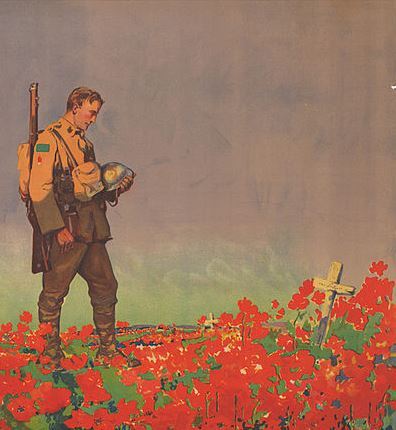
Today the official commemoration for the centenary of WW1 will begin in Belgium. So I thought it only fitting to post this most famous of anti-war poems by a poet who fought and died in World WarI - Wilfred Owen.
Owen was only 22 when he joined the British army to serve in the War and 25 when he died. During the course of his time in the trenches and battlefields, he wrote impassioned poetry against what he saw. This poem Dulce Et Decorum was not just an anti-war poem, with its real and graphic depiction of what being on the battlefield was really like, it was also an anthem of defiance.
The title comes from the Latin phrase 'Dulce Et Decorum Pro Patria Mori' - 'Sweet and honourable it is to die for one's country' used to peddle the propaganda of enlisting. Owen debunks this myth for what it is: a lie, a farcical tragedy, a motive for mass murder. His rendition of the battlefield is the complete opposite of honour and glory. In the reality of the trenches, the soldiers are not proud marching patriots but pathetic creatures wracked by the experience, 'bent double, like old beggars under sacks.' They stagger and 'trudge' and 'fumble' along - not the expected image of soldiers on the front. The description of the poor man caught in a gas attack is particularly harrowing - 'If you could hear, at every jolt, the blood/Come gargling from the froth-corrupted lungs...' and is the death Owen uses to show us how there is certainly NOT anything remotely sweet and honourable about young men dying horribly in a war.
Like all the best poems too, Dulce Et Decorum is universal. It does not apply solely to the trenches of WWI, but to every war, even those today, with the essential message that war is horrible and awful and useless.
Dulce Et Decorum Est - Wilfred Owen
Bent double, like old beggars under sacks,
Knock-kneed, coughing like hags, we cursed through sludge,
Till on the haunting flares we turned our backs
And towards our distant rest began to trudge.
Men marched asleep. Many had lost their boots
But limped on, blood-shod. All went lame; all blind;
Drunk with fatigue; deaf even to the hoots
Of disappointed shells that dropped behind.
GAS! Gas! Quick, boys! - An ecstasy of fumbling,
Fitting the clumsy helmets just in time;
But someone still was yelling out and stumbling
And floundering like a man in fire or lime.
Dim, through the misty panes and thick green light
As under a green sea, I saw him drowning.
In all my dreams, before my helpless sight,
He plunges at me, guttering, choking, drowning.
If in some smothering dreams you too could pace
Behind the wagon that we flung him in,
And watch the white eyes writhing in his face,
His hanging face, like a devil's sick of sin;
If you could hear, at every jolt, the blood
Come gargling from the froth-corrupted lungs,
Obscene as cancer, bitter as the cud
Of vile, incurable sores on innocent tongues,-
My friend, you would not tell with such high zest
To children ardent for some desperate glory,
The old Lie: Dulce et decorum est
Pro patria mori.
*(Written 1917/Published posthumously 1920)
Google Sites is a free website builder from Google. You can create websites with collaborators by giving another Google user edit access. Google Sites are compatible with other Google services like Docs, Sheets, and Slides.
ReplyDeleteSpace bar test